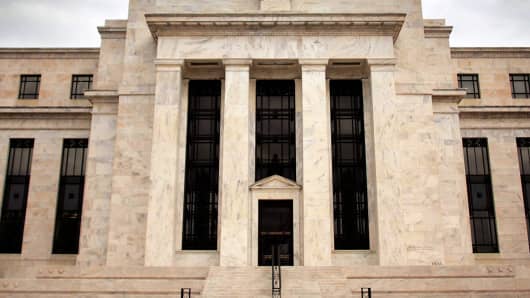That changed when former Treasury Secretary Larry Summers' name came up in repeated news stories.
"It's a pivotal time for Fed policy, and it would be advantageous to have someone at the helm who had already gone through the analytical process of getting comfortable with the last five years of policy rather than coming in with a completely clean slate and trying to potentially reinvent it," said Ian Lyngen, senior Treasury strategist at CRT Capital.
Lyngen said rates have moved slightly higher since the speculation about Summers began to swirl, and the may have added 10 to 15 basis points to the 10-year yield, at 2.59 percent late Monday.
"At its essence, anyone who is not Yellen is seen as less dovish," he said. "The outcome would be higher rates, whether it's Summers, (former Treasury Secretary Tim) Geithner or (former Fed Governor) Larry Meyer."
Summers' name appears to have been leaked as a trial balloon, but some Fed watchers think he would have a rockier Senate Banking Committee confirmation hearing than Yellen. Some Senate Democrats, meanwhile, circulated a letter urging the president to appoint Yellen to the position.
(Read more: US judge says ex-AIG CEO can depose Bernanke over bailout)
"I was convinced it was Yellen, and now I'm less convinced it's her. Summers has been mentioned, but let's not forget Geithner or (former Fed vice chairman) Roger Fergusson. The issue is when President Obama needs to make the decision. The longer he waits, maybe it makes it less likely Vice Chair Yellen is the person," said Deutsche Bank Chief U.S. Economist Joseph LaVorgna.
Ward McCarthy, chief financial economist at Jefferies, said the situation has already become disruptive. "From a market standpoint, I think that the transition from Bernanke to Yellen would be a whole lot easier and create a lot less, at least initially, confusion and uncertainty," he said. "Everybody has a good handle on Janet Yellen's commitment to QE. Larry Summers, on the other hand, doesn't really have a broad and deep track record on QE, but the isolated comments he has made would suggest he is less enamored of that type of policy."
The Fed is about to embark on slowing down part of the most extraordinary policies its ever undertaken, and the uncertainty has already sent interest rates to a new higher range. Bernanke, however, has managed to build in expectations that the Fed could begin tapering this year, will not move quickly to end the program, and that it will be driven by the economic data, not a timetable. He has also reassured markets the Fed does not intend to tweak short term rates any time soon.
"I don't think this is a great time to be tacking," said McCarthy. "It's added to uncertainty and anxiety and that usually means higher rates. This type of uncertainty and campaigning is not helpful. It's not something that happens on a routine basis, so you can't really say there's a routine way of approaching this. However, this isn't good for anybody. It makes them look like they can't make a decision."
(Read more: 'Rally has gone too far,' Citi strategist says)
President Obama, in an interview in the New York Times this weekend, said he had not made a final decision, but that he's narrowed it down to "some extraordinarily qualified candidates." He said the next chairman has to understand the Fed has a dual mandate and would work to "keep inflation in check, to keep our dollar sound, and to ensure stability in the markets."
He also said when unemployment is still too high, "I want a Fed chairman that can step back and look at that objectively and say, let's make sure that we're growing the economy, but let's also keep an eye on inflation, and if it stars heating up, the markets start frothing up, let's make sure that we're not creating new bubbles." Some Fed watchers said that particular comment would suggest Obama may be more intent on an outside candidate, since he pinpointed the concerns that critics have had about the Fed's QE programs.
As for the Fed, it will most certainly discuss policy this week, and also when it might taper, even how it might start tapering. But there is little chance it announces any moves when it releases its statement Wednesday.
(Read more: Bernanke: Too early to tell when tapering will start)
"On the Fed meeting, I wouldn't expect major change," said Goldman Sachs Chief U.S. Economist Jan Hatzius. "I think you'll probably get some downgrade of the description of the economy, possibly housing. They might want to downgrade slightly. Last time they said it strengthened further. That might go."
"I think it's quite possible they don't do anything on the policy language," he said. Hatzius said if the Fed does want to comment on tapering, it would probably do so in a way that supports Wall Street's default expectation that tapering will start in September. It would also reinforce that the committee will decide to slow down bond purchases, based on the economic data.
"The (post-meeting) minutes will be interesting, but I don't think that statement will be. That's the bottom line. I don't think there's enough information for the Fed to even think of tapering," said LaVorgna.
Besides waiting for the Fed Tuesday, traders will be watching a gusher of earnings reports, including Merck, Pfizer, BP, Chrysler/Fiat, Deutsche Bank, UBS, Barclays, Sprint Nextel, JetBlue, Thomson Reuters, Occidental Petroleum, NYSE Euronext, Coach and Corning, before the bell. After the closing bell, Buffalo Wild Wings, Boston Properties, Amgen, Aflac, Symantec, and Genworth report.
In the morning, S&P Case-Shiller home price data is released at 9 a.m. ET, and consumer confidence is released at 10 a.m.





